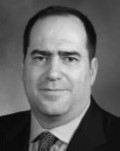| Name: |
Howard A. Riina, MD |
| City & State: |
New York, New York |
| Country: |
United States of America |
| Membership Status: |
Active |

Howard A. Riina is the Lucius N. Littauer Professor and Vice Chairman of the Department of Neurosurgery and Director of the NYU Center for Stroke and Neurovascular Diseases at New York University Langone Medical Center. He was born in Brooklyn, New York. He received undergraduate degrees from both Franklin and Marshall College and the University of Pennsylvania in a dual degree 5-year bioengineering program in 1987. He graduated from Temple University School of Medicine in 1993. Between his third and forth years of medical school he obtained an M.Phil in Biology (molecular neurobiology) from the University of Cambridge. He completed his surgical internship and trained in neurological surgery at the Hospital of the University of Pennsylvania with Drs. Eugene S. Flamm and M. Sean Grady.
Dr. Riina has completed three fellowships: Diagnostic Neuroradiology with Robert Grossman, M.D. at the Hospital of the University of Pennsylvania, Interventional Neuroradiology with Alejandro Berenstein, M.D., at the Institute of Neurology and Neurosurgery Beth Israel Medical Center, and Cerebrovascular and Skull Base Surgery with Robert F. Spetzler, M.D. at the Barrow Neurological Institute. In 2001, Dr. Riina was recruited to Weill Medical College of Cornell University, New York Presbyterian hospital to perform both open cerebrovascular surgery and interventional neuroradiology. He was Professor of Neurological Surgery, Neurology and Radiology and Residency Program Director of the Department of Neurological Surgery at the Weill Medical College of Cornell University, New York Presbyterian Hospital.
He was Co-Director of Interventional Neuroradiolgy at New York Presbyterian Hospital prior to joining the faculty of the NYU School of Medicine. Dr. Riina specializes in the surgical and endovascular treatment of cerebrovascular disorders of the brain and spinal cord. He has particular interest in the treatment of intracranial aneurysms and arteriovenous malformations of the brain and spinal cord. He has also been involved in new treatments for acute stroke. Most recent interests involve the development of new minimally invasive treatments for cerebrovascular and skull base disorders. Dr. Riina currently serves as Chair of the CESAC committee and as a Director of the ABNS.